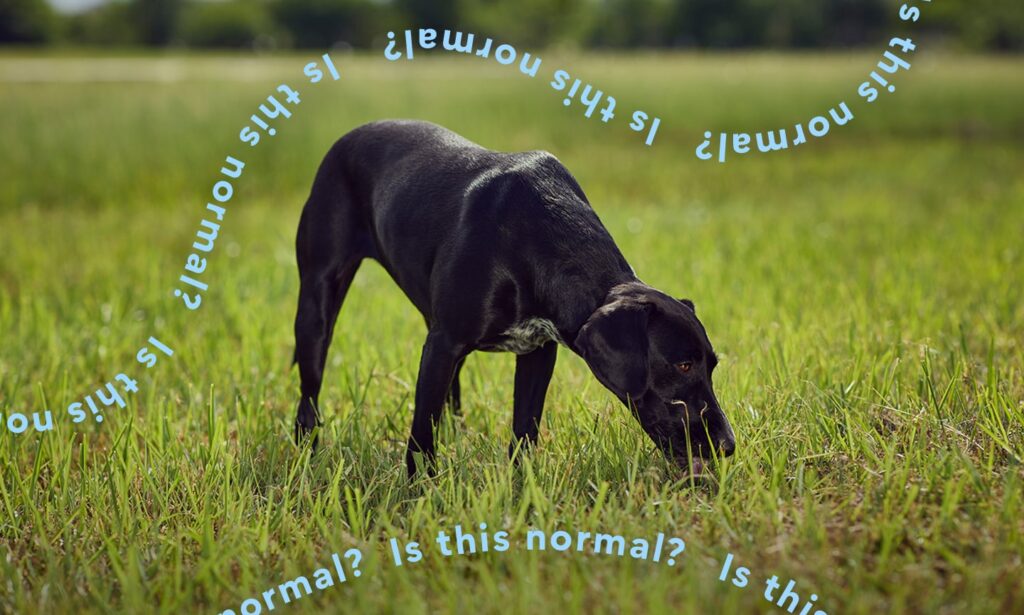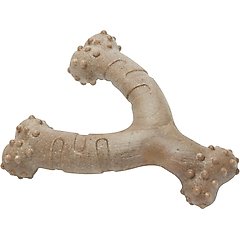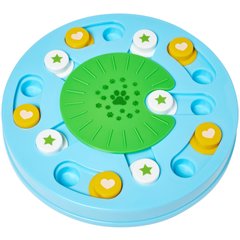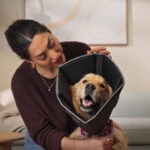Why Do Dogs Eat Grass? Is This Normal?

Photo by Chewy Studios
Q: Whenever I take my dog outside, they want to eat grass. Why do dogs eat grass? Is this normal?
A: Good news, pet parents: It’s normal-ish for your pup to eat grass—but there are some things to be on the lookout for.
If your dog chomps on a few blades here and there, it may be because they’re bored or because they just like the taste of grass. However, there are instances in which it can be cause for concern.
We tapped two veterinarians to find out exactly why dogs eat grass—and what you can do about it.
Why Do Dogs Eat Grass?
There are several reasons why dogs eat grass, ranging from boredom and behavioral issues to more serious health issues and nutritional imbalances.
They’re Bored
Just like humans, dogs can get bored and will find creative ways to entertain themselves. Because they can’t exactly turn on Netflix or scroll through TikTok, they turn to eating grass to keep themselves busy.
“Dogs will eat small amounts of grass occasionally under normal conditions,” says Sarah J. Wooten, DVM, CVJ, a veterinarian based in Silverthorne, Colorado.
“If your dog occasionally nibbles a few blades here and there, then there isn’t anything to worry about,” she adds, as long as the grass itself is safe to eat (more on that below).
They May Have Behavioral Issues
If your pup seems perfectly healthy but can’t seem to shake their grass-eating habit (for example, you notice they always make a beeline for the same grassy patch or only eat certain blades along the fence), it may be caused by behavioral issues, such as anxiety, says Marc Bercovitch, DVM, DACVIM (SAIM), a veterinary small animal internal medicine specialist at MedVet in Mobile, Alabama.
Eating grass can serve as a coping mechanism that helps stressed or anxious dogs calm down, similar to licking and chewing.
They Have an Upset Stomach
“Dogs will eat grass to try and feel better if they are nauseous or their stomach otherwise hurts,” says Dr. Wooten.
While grass may help settle their stomach, eating large amounts of grass can actually upset their stomach and cause dogs to vomit.
“Most dogs eat grass and don’t throw up,” Dr. Wooten says, “but if they are eating grass and throwing up, that is cause for concern and shows that their stomach is upset.”
As always, if your dog is showing signs of illness such as vomiting or lethargy, it’s definitely worth taking them to the vet to get a checkup.
They Like the Taste
It’s possible that some dogs just really love the taste of grass and want to chow down on an all-you-can-eat lawn buffet.
Before the days of kibble and canned food, our pup’s ancestors consumed grass and other plants by way of their prey (i.e., that’s what their prey ate and when eating their prey, they also ate the prey’s stomach contents). So, your dog could just be tapping into their wild instincts.
They Have a Nutritional Deficiency
Speaking of a dog’s diet, our canine BFFs are omnivores with very specific nutritional needs. (Read: They need more than an all-meat diet.)
Dr. Bercovitch says they could be eating grass because they’re “lacking fiber or nutrients in their diet” or they could have “underlying intestinal inflammation resulting in pica.” (FYI, pica is a condition in which dogs compulsively eat non-food items such as paper, wood, dirt, socks, or, you guessed it, grass).
“If your dog is eating grass for non-behavioral reasons, it could signal an underlying medical condition,” Dr. Bercovitch explains. “This may not be life-threatening but nonetheless should be investigated as your pet is trying to tell you something.”
Is It OK for Dogs To Eat Grass?
Generally speaking, eating a few blades of grass in your backyard won’t hurt your pup. However, there are a few times when you should be extra vigilant and redirect this behavior.
Don’t Let Your Dog Eat Grass in Public Areas
“Some diseases can remain in the grass for weeks and still be infectious,” Dr. Bercovitch explains. “The one most would be familiar with would be canine parvovirus.”
Parvovirus is an extremely contagious (and sadly very common) virus that spreads through direct contact with an infected dog or infected vomit and feces, or indirect contact with a contaminated object. So, if your pup is sniffing around or eating grass with infected feces, they could get sick.
Don’t Let Your Dog Eat Treated Grass
That includes grass that has been treated with herbicides, pesticides, fertilizers, or other chemicals. Even grass from your own yard could be a potential danger if it has been treated.
“Pesticides and lawn sprays are toxic,” Dr. Wooten says.
Also beware of toxic plants in your yard. Dr. Wooten recommends checking the ASPCA for a list of toxic yard plants and making sure your pup doesn’t try to eat them.
Don’t Let Your Dog Eat a Lot of Grass
“Dogs can eat so much grass that it can cause an intestinal obstruction necessitating surgery,” Dr. Bercovitch says.
Though it sounds extreme, it can happen.
What Should I Do If My Dog Eats Grass?
If you believe your dog’s grass eating is due to anxiety or other behavioral issues, Dr. Bercovitch recommends “diversion, distraction, and environmental enrichment.” Some recommendations include:
- Increase your pup’s daily exercise (#morewalksplease).
- Provide plenty of chew toys.
- Stimulate them mentally with lots of enrichment activities, like dog puzzles.
Consider filling a KONG toy with dog-safe peanut butter (free of xylitol, which is toxic to dogs) or a little pumpkin puree (not pumpkin pie filling) and freezing it or smearing their wet food on a lick mat and then freezing it.
These activities will make your four-legged friend have to work a bit harder for their food, and the act of smelling, licking, and chewing can help reduce anxiety and boredom in dogs.
Recommended Products
When To Go To the Vet If Your Dog Is Eating Grass
If you’ve tried the above steps and your dog is still eating grass daily or is eating a lot of grass and then getting sick, Dr. Wooten recommends getting them checked out by a veterinarian to make sure there are no underlying medical conditions.
Your vet may recommend changing your dog’s diet to meet their specific nutrition needs or performing a more thorough exam to get to the root of the issue.
If your vet believes the issue to be behavioral, they or a board-certified veterinary behaviorist can recommend a specialized treatment plan.
FAQs About Dog Eating Grass
Q: Why is my dog suddenly eating grass like crazy?
A: A dog suddenly eating grass may be an indication that they have an upset stomach.
Q: Do dogs eat grass and vomit?
A: Sometimes dogs will vomit after eating grass but not always.
Q: How long after eating grass will a dog vomit?
A: Some dogs may vomit right away, while others may vomit several hours later due to the irritation the grass causes in their stomachs.
Q: What does it mean when a puppy eats grass?
A: Puppies may eat grass as part of their exploratory behavior. Because puppies do not have fingers to touch items, they use their mouth, teeth, and tongue to explore.
Attributions
This content was medically reviewed by a veterinarian.






